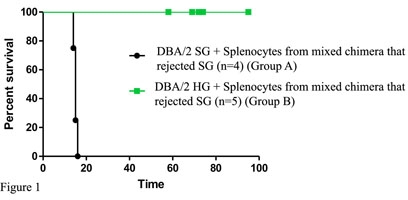Rejection of an Allograft Through Non-MHC Antigens Does Not Translate to the Rejection of a Different Allograft from the Same Donor in Mixed Chimeras
1Transplant Center, Massachusetts General Hospital, Boston, MA
2Pathology, Massachusetts General Hospital, Boston, MA.
Meeting: 2015 American Transplant Congress
Abstract number: 150
Keywords: Alloantigens, Mixed chimerism, Tolerance
Session Information
Session Name: Concurrent Session: T Cell Mediated Rejection: Animal Models
Session Type: Concurrent Session
Date: Sunday, May 3, 2015
Session Time: 4:00pm-5:30pm
 Presentation Time: 4:48pm-5:00pm
Presentation Time: 4:48pm-5:00pm
Location: Room 120-ABC
We previously showed that tolerance, induced by mixed chimerism in mice, is antigen-specific: tolerance of heart and skin allografts is dependent on Foxp3+ cells that regulate the response to non-MHC antigens, whereas, tolerance of MHC antigens on hematopoietic cells is independent of Foxp3 regulation and consistent with deletional mechanisms. The current study is aimed to investigate whether non-MHC antigens are shared between different types of allografts and whether the rejection of one type of allograft affects the subsequent alloresponses to a different organ from the same donor.
We took mixed chimeras (DBA/2 (H2d) x B6.Foxp3DTR/DTR) with long-term accepted donor-type DBA/2 skin allografts and depleted donor and recipient-derived Foxp3+ cells with diphtheria toxin (DT). Skin allografts were rejected without loss of hematopoietic chimerism. We then re-challenged with a second DBA/2 skin graft that rejected within 19 days without depletion of Foxp3+ cells. Splenocytes from these mixed chimeras were harvested 4 weeks after complete rejection of DBA/2 skin grafts and were adoptively transferred to B6.Rag1 knockout recipients who were transplanted with DBA/2 skin allografts (SG) (Group A, n = 4) or DBA/2 heart allografts (HG) (Group B, n = 6).
All recipients in Group A rejected both donor (DBA/2) and third-party (C3H) skin grafts (SG). All recipients in Group B continued to accept donor-type heart allografts (HG) for more than 8 weeks (Figure 1). Adoptive transfer of splenocytes from mixed chimeras that never rejected DBA/2 skin to B6.Rag1 knockout recipients transplanted with DBA/2 and C3H (3rd party) skin allografts resulted in the rejection of only the C3H skin (n= 5).
We conclude that T effector memory specifically develops to non-MHC antigens to the rejecting allograft and not to any other allograft from the same donor. These data have implications with regards to our understanding of how antigen-specific regulatory T cells are induced in mixed chimera tolerance protocols.

To cite this abstract in AMA style:
Shinoda K, Chase C, Russell P, Madsen J, Colvin R, Alessandrini A. Rejection of an Allograft Through Non-MHC Antigens Does Not Translate to the Rejection of a Different Allograft from the Same Donor in Mixed Chimeras [abstract]. Am J Transplant. 2015; 15 (suppl 3). https://atcmeetingabstracts.com/abstract/rejection-of-an-allograft-through-non-mhc-antigens-does-not-translate-to-the-rejection-of-a-different-allograft-from-the-same-donor-in-mixed-chimeras/. Accessed July 2, 2025.« Back to 2015 American Transplant Congress
